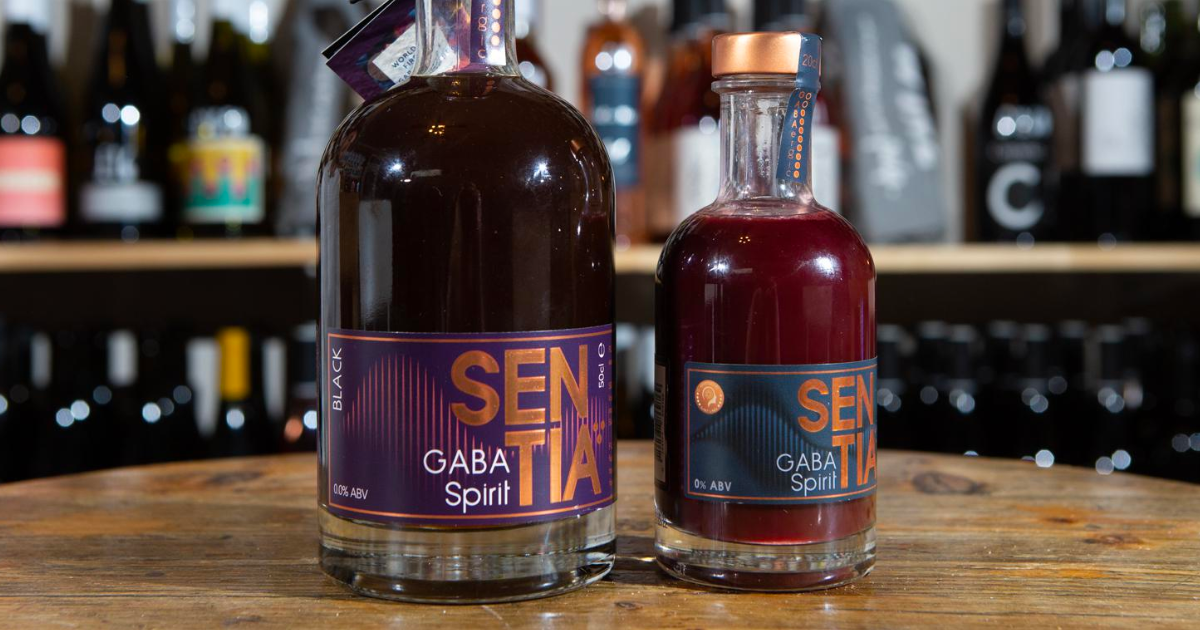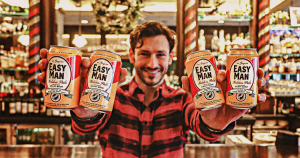Many modern non-alc drinks are categorized on Dry Atlas as “functional,” so called because the drinks claim to have some degree of psychoactive effect upon the user, altering mood, consciousness, cognition, or behavior. Some users find that, especially in relation to alcohol’s psychoactive effects, the functional effects of non-alcoholic drinks can be subtle or even imperceptible.
With that in mind, let’s explore three very different functional non-alcoholic drinks from the past, present, and future that claim to have much more perceptible effects on the drinker.
Note: consult a healthcare professional before making any changes to your food and beverage consumption. Functional beverages can have adverse effects for pregnant women, people on certain medications, and other groups.
Past: Ether
Ether, primarily diethyl ether, was widely used as an anesthetic in the 19th century. Its intoxicating effects led some to consume it recreationally. It provides a brief, euphoric high with users experiencing dizziness, euphoria, and altered perception.
The 19th century’s temperance movement increased recreational usage as many alcohol enthusiasts who had taken a temperance pledge found a clever loophole. Ether provided the intoxication they sought with none of the alcohol they promised to forgo. What could go wrong?
“We had two bags of grass, seventy-five pellets of mescaline, five sheets of high powered blotter acid, a salt shaker half full of cocaine, and a whole galaxy of multi-colored uppers, downers, screamers, laughers… and also a quart of tequila, a quart of rum, a case of Budweiser, a pint of raw ether and two dozen amyls…
The only thing that really worried me was the ether. There is nothing in the world more helpless and irresponsible and depraved than a man in the depths of an ether binge.”
― Hunter S. Thompson, Fear and Loathing in Las Vegas
Unfortunately for ether users, a lot went wrong. Ingestion of ether led to lung, liver, and nervous system damage. It’s highly flammable and volatile, which made its storage, transport, and use inherently dangerous, especially in settings where open flames might be present (almost everywhere, in the 19th century). The taste and smell of ether are extremely pungent and unpleasant, and they taint the user long after consumption has ended. For these and other reasons, very few people consume ether today.
Verdict: Not recommended
Present: Ketones
If you’ve ever tried the keto diet, you may have experienced a feeling of mild euphoria, mental clarity, or other mood changes. These feelings are caused by ketones supplanting glucose as the brain’s primary fuel source.
Recently, at least one brand has begun experimenting with exogenous ketone supplementation via beverages, resulting in the same mild psychoactive effects without having to eat a T-bone steak for breakfast.
Hard Ketones coined the term ketohol as a brand name for R 1,3 Butanediol (R 1,3 BD), which they market as an alcohol alternative. When ketohol enters the liver, it makes D-BHB, which raises blood ketones. That’s how this non-alcoholic beverage offers a mild euphoria similar to the one experienced by keto dieters.
However, drinking R 1,3 BD is not without risks. While ketones are a natural energy source for the body, overconsumption of exogenous ketones can lead to stomach upset. The long-term effects of frequent exogenous ketone consumption are still under research. That all said, Hard Ketones could prove to be a safe and viable solution for those seeking a functional alcohol alternative to enhance focus and energy.
Verdict: Will try
Future: GABA (Gamma-Aminobutyric Acid)
GABA is a naturally occurring neurotransmitter in the brain known for its calming effects. Several existing non-alc drinks already make use of GABA as an inhibitory neurotransmitter. GABA can help to reduce anxiety, promote relaxation, and even aid in sleep. Some proponents argue that GABA supplements can provide the “relaxed” feel of a drink without the negative side effects.
None has gained as much attention as GABA Labs and their initial non-alc spirit release, Sentia. Sentia contains a host of active botanicals that claim to naturally enhance one’s mood. But what interests me more is the ingredient it doesn’t yet contain: Alcarelle, a proprietary liquid developed by Sentia Spirit’s parent company, GABA Labs.
Alcarelle appears to still be in testing, but GABA Labs’s co-founder David Orren claims it will allow them to achieve a stronger, more effective “synthetic alcohol” buzz without relying on Sentia’s botanicals. Botanicals impart flavors. Alcarelle, on the other hand, could be added to any non-alc spirit, wine, etc. for functional effect without affecting flavor, making it more versatile than botanicals.
Risks remain. Long term over-reliance on GABA supplements might reduce the body’s natural production. There’s also ongoing debate regarding the bioavailability of GABA supplements, with some arguing that they don’t cross the blood-brain barrier effectively. That all said, Alcarelle could prove to be a game-changing alcohol alternative for those seeking sociability and enhanced connection.
Verdict: Excited to try
In Conclusion
Alcohol alternatives have come a long way since the 19th century!
While the search for a perfect alcohol substitute continues, it’s essential to approach these alternatives with both curiosity and caution. Each functional alcohol alternative offers a unique profile of effects and risks. Before diving into any alternative, it’s important to do your own research and, if appropriate, consult with a healthcare professional.
Moreover, it’s important to consider whether you actually want a functional drink at all. The very idea of functional drinks is psychoactive-normative and heavily influenced by alcohol’s pervasiveness in culture and society. It’s personal for each of us, but perhaps your goal isn’t to replicate the feeling of alcohol but simply to find a delicious adult drink with which to relax, enjoy, and connect. Maybe the best buzz for you is no buzz at all.






